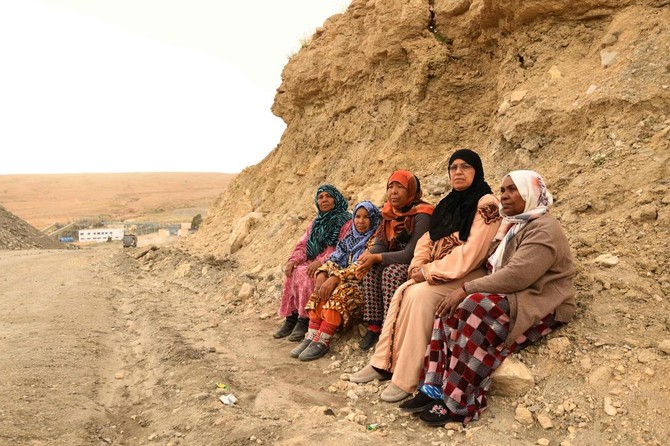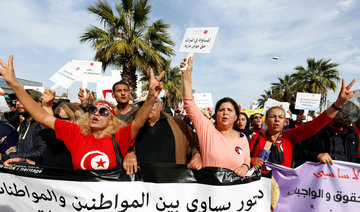METLAOUI: Dozens of unemployed youths camp out around phosphate mines in central Tunisia, demanding jobs as part of a wave of protests aimed at focusing attention on alleged state neglect.
The surge in anger is the latest in the North African nation’s mining region, where one of the country’s highest unemployment rates and a stark lack of infrastructure have fueled regular unrest.
The most recent confrontations broke out at the end of January, with demonstrators frustrated over hiring practices blocking work for six weeks.
Among the grey dunes of phosphate at the Kef Eddour quarry near the town of Metlaoui, 10 women and about 50 young men — sons and grandsons of miners — eat and sleep in a few prefabricated cabins.
“The phosphate company is the only thing here, we have no development, no jobs,” said Ali Ben Msalah, 25, who has been unemployed since finishing high school.
“For us, the solution is either emigration, death or prison.”
Next to him, Souad Smadah, 60, the daughter and wife of miners, nods as she warms couscous and tea over a fire for the young protesters.
She is angry that none of her five sons have managed to find work at the phosphate mines, accusing businessmen and trade unions of prioritising their relatives when hiring.
Smadah’s eldest earns 300 dinars ($125 or 100 euros) a month in a bakery, almost three-times less than a starting salary at the mine.
'Little Paris'
Metlaoui is rich in phosphate, a highly sought after ore used to make fertilizer of which Tunisia is the world’s fourth largest producer.
Boasting a swimming pool, cinema and tennis courts, it was once nicknamed “Little Paris.”
Today, however, the town’s jobless youth loiter along cratered roads, their teeth yellowed from polluted water.
The Gafsa Phosphate Company (CPG), a state monopoly, has long been the main source of jobs and income for the region.
Decades of corrupt or absent authorities sparked mass protests around the mines in 2008 that were brutally repressed by dictator Zine El Abidine Ben Ali.
His fall in a 2011 uprising which sparked the Arab Spring upheavals sparked hope of change.
But there has been no sign of improvement and a combination of lack of investment, skilled workers and unrest has even seen output nosedive.
“Since the revolution, we can no longer produce the desired tonnage,” said CPG’s general secretary, Ali Khmili.
The company, which used to produce up to 8 million tons a year, barely extracted 4.2 million last year.
The most recent disruption to the mine’s work began in January after the series of demonstrations and riots, fueled by price and tax increases and persistent unemployment, broke out in the region and across Tunisia.
Adding to the tensions are looming municipal elections scheduled for May, with legislative and presidential elections set for 2019.
In Gafsa, the heightening of political tensions has complicated negotiations with the protesters, paralysing production earlier this year.
The halt in work was “essentially linked to a lack of trust” between residents and the government, according to Rabeh Ahmadi, an activist with the Tunisian Forum of Economic and Social Rights (FTDES), an NGO specializing in social issues.
The government eventually demanded legal action and suspended some 1,700 hires in progress in an attempt to quell the unrest.
Unhappy residents
Mining slowly resumed this month and ministers were dispatched to the region last week. But residents unhappy with solutions proposed by the government have continued to disrupt production.
They say it is the only way to force those in power to pay attention to them, as phosphate is crucial to reaching the government’s target of three percent growth
CPG, which is running at a deficit largely because of recurring unrest, has not contributed to the state budget since 2011.
And some at the company warn that by targeting the phosphate output the demonstrators could end up just hurting their region even more.
“The protesters’ claims are legitimate, there is a total absence of the state in this area,” said Rafiq Smida, an CPG engineer and advocate for the phosphate industry.
“But if work there is blocked, 32,000 jobs are at risk.”





























